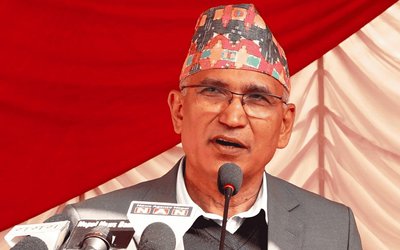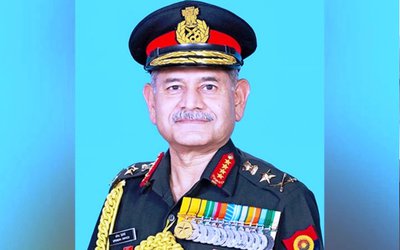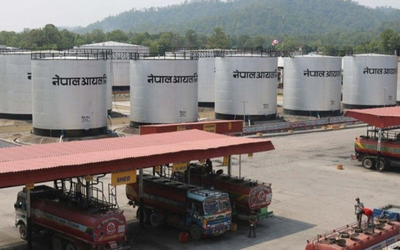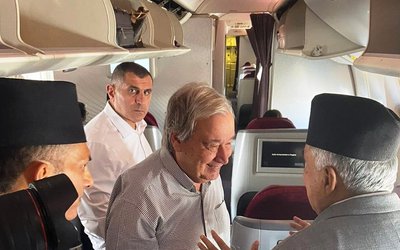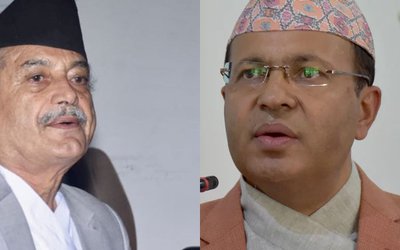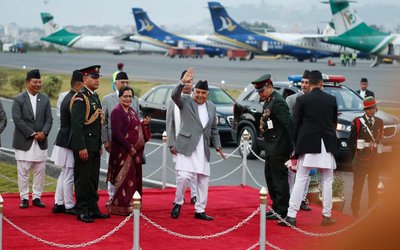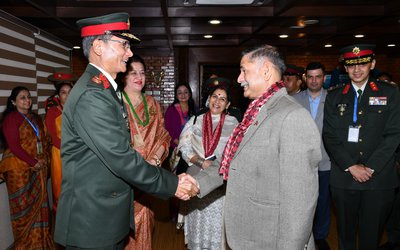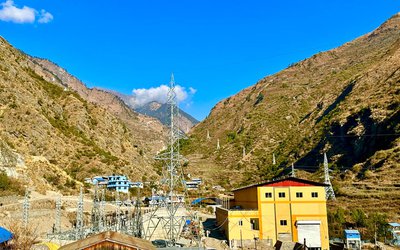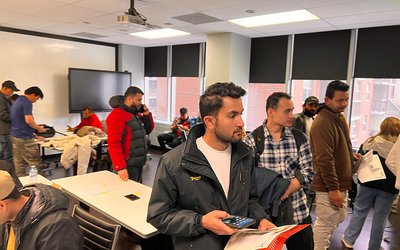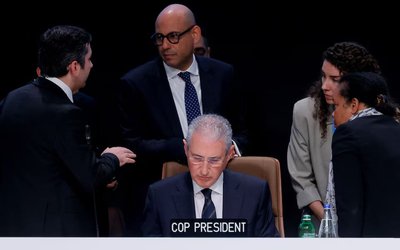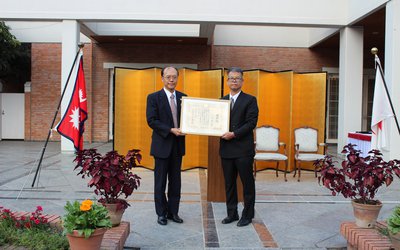
To celebrate the National Day of State of Qatar and the commemoration of Sheikh Jassim Bin Mohammed Al-Thani, the founder of the state of Qatar, Ahmed Jassim Al Hamar, the ambassador of the State of Qatar to Nepal, hosted a reception at Hotel Yak and Yeti. The chief guest of the reception was vice president Parmananda Jha.
People from different walk of life including chairman of Constituent Assembly Subhas Chandra Nembang, ministers, leaders of political parties, high level government officials, Kathmandu based foreign ambassadors, former Nepalese diplomats, Business communities, Qatar’s citizens living in Nepal and other were also present.
Sheikh Jassim bin Mohammad Al-Thani, Emir and founder of the modern State of Qatar, descended from the Tameem Tribe. Born in 1242 Hijra corresponding to 1826 AD, he acquired full capability in the management of the country's affairs since his youth, succeeded in guiding its policies with wisdom and steered the country during a period that witnessed major events and changes.
At the local level, he sought to turn Qatar into a single unified and independent entity. Under his leadership, Qatar emerged as a coherent and stable country whose tribes he assembled to usher its future and thus consolidating its existence and borders. Regionally, Sheikh Jassim adopted a shrewd policy in dealing with the two major powers competing to dominate the Arabian Gulf and its territories, namely the British Empire, which had to extend its influence through the Government of India, and the Ottoman Empire, which was seeking to retain its control of the region following the demise of the Portuguese influence in the sixteenth century.
December 18, 1878 was a turning point when Sheikh Jassim took power. It was also the inception of the modern State of Qatar achieved as a result of Sheikh Jassim's assiduous efforts that led to gaining full recognition by both powers of Qatar's independence.
The era of Sheikh Jassim was marked by security, justice and welfare. Total renaissance and prosperity were then experienced in all social and economic aspects of life. That was clearly evident in the pearl diving business and Qatar became one of the major pearl exporters. Maritime transportation business and means developed. The Qatari port which was upgraded to cope with the growing import and export traffic requirements helped the development of this sector. More ships operated in the fields of trade, diving for pearl or transport. Businesses, resources and markets also thrived and diversified along with the population growth and urban expansion.
World Cup Preparation for 2022
Giving a strong push to Qatar’s preparations for the 2022 FIFA World Cup, the Emir HH Sheikh Tamim bin Hamad Al Thani approved on 30th of March this year the country’s highest ever general budget for the fiscal 2014-15 with projected revenues of QR225.7bn, 3.5 percent higher than that in the last fiscal.
The government spending for the new fiscal is projected at QR218.4bn, up 3.7 percent with an expected surplus of QR7.3bn. The surplus forecast for the new fiscal is down 0.1 percent compared to the last fiscal’s QR7.4bn.The increase in spending has been mainly dedicated to the completion and implementation of key development projects that have been allocated QR87.5bn, up by 16 percent from the previous budget.
For the third straight year, the budget assumed a conservative oil price of $65 a barrel when calculating projected revenue, which means the surplus could turn out higher than forecast. Total expenditure on education, health, infrastructure and transportation has risen to 54 percent in the financial year 2014-15 budgets compared to 48 percent in the previous budget. This is expected to provide a leap forward for these sectors.
The projected spending shows nearly half of the total expenditure will go for infrastructure development and social benefits, with 35 percent of the total allocations to infrastructure projects. Infrastructure appropriations are the largest in the new fiscal, with a 22 percent increase to QR75.6bn to enable the completion of major infrastructure expansion and development projects related to Qatar 2022 FIFA World Cup. The budget has earmarked QR26.3bn for the education sector, up 7.3 percent from the previous budget. The health sector will also get a boost with the allocations reaching QR15.7bn, a 12.5 percent increase on allocations in the last budget.
Allocations to provide housing for Qatari nationals have increased to QR3.3bn, up 18 percent from the previous fiscal. These funds will be used to complete 3,700 housing units under construction and to build 2,300 new homes benefitting 6,000 nationals, ensuring that there is no waiting list for housing. Lending strong support to the private sector’s participation in Qatar’s development, the finance minister emphasized that the government will continue to encourage and support the private sector. In the next stage, the private sector will witness a strong growth and play a fundamental role in the country’s development.
The resilient growth anticipated in the non-oil sector offers the private sector an opportunity to boost its contribution to GDP growth, providing for further economic diversification and overall sustainable development. The government adopts a set of policies to support the private sector, such as avoiding competition between the public and private sectors in the local market, assigning more of the implementation of projects to the private sector and encouraging the ministries and state institutions to outsource its supporting business services to private sector.
Qatar has enjoyed unprecedented global recognition in sport in recent years and continues to advance through targeted efforts aimed at creating a safer, healthier and more peaceful society. Qatar invests heavily through the Qatar Olympic Committee (QOC) and its partner clubs, sports federations, the Aspire Zone Foundation and other strategic allies, to increase the supply of sport and active recreation facilities, develop athletes, host international competitions and raise awareness of the benefits of sport and physical activity.
The Qatar National Vision 2030 (QNV 2030) sets out the principles for Qatar’s sustainable and balanced development, based on a vibrant and prosperous economy that provides economic and social justice, stability and equal opportunity for all. In order to operationalize the goals and objectives of QNV 2030 and to provide a coherent basis for planning, Qatar’s first National Development Strategy 2011-2016 (NDS) is being prepared. The Sports Sector Strategy 2011-2016 (SSS) is one of fourteen sector strategies that will be integrated into the NDS.
The QNV 2030 commits to maintaining harmony between economic growth, social development and environmental management, as well as improving people’s quality of life. The QNV 2030’s social development pillar pledges to build a safe, secure and stable society that is centered on effective institutions and leads to the promotion of tolerance, benevolence, constructive dialogue and openness.
Physical activity occupies a central role in enriching lives, with participation in sport being a source of health and enjoyment for5those who join as players, volunteers, coaches, observers, officials or administrators. It is often abiding element in the social and cultural fabric of society.
Qatar will continue to place emphasis on sport, especially to meet the challenges presented by a rapidly increasing and youthful population, cultural change and more affluent lifestyles. Like many developed societies, Qatar’s health system is challenged by the cost of treating chronic preventable diseases borne from sedentary lifestyles and a lack of physical activity. The increasing prevalence of obesity leading to hypertension, heart disease and diabetes, requires a whole-of government strategy starting with physical education and training in childhood, traversing through rigorous sports activity in adulthood and culminating in moderate physical activity at older ages.
Hosting of the FIFA 2022 World Cup in Qatar may be considered as an enabler that will support achievement of some of the goals of other sectorial strategies that are part of the National Development Strategy. For example, by using an eco-friendly green technology, diversifying sources of income by engaging the private sector, and through the development of sports tourism. It will also contribute to raising the Qatar’s profile regionally and internationally, create job opportunities, build the capability of young people and produce efficient and productive workforce. Further it is expected have a major impact on national sports through youth, providing high standards sport facilities and increasing the level of participation in sport and physical activity, including improved performance in sports.
In Qatar, the sports sector is playing an increasingly prominent role in shaping national identity and progress. The achievements thus far, including the successful staging of the 15th Asian Games in 2006 and other major sporting events, have helped change Qatar’s image in the world. Success in sports has become an inspiration for the whole society and contributes to an energized, confident and modernizing nation.
Sports development is integral to the four pillars of the Qatar National Vision 2030 (QNV 2030). Qatar is committed to increasing sports participation and active lifestyle practices among its population to improve health and sport outcomes, and is using sports to forge friendships and improve relations between nations worldwide. It is also building itself to become a global sports hub with an array of first class sports facilities and a host of regional and international sporting events.
Excerpts of document: Courtesy of the Embassy of the State of Qatar- Kathmandu
- PM Oli's Visit To China: Geopolitical Implications
- Nov 19, 2024
- NEA: Kul Man Ghising, A Cool Man
- Oct 28, 2024
- DASHAIN FESTIVAL : Festival of Unity
- Oct 04, 2024
- NEPAL-CANADA Bilateral Meeting
- Oct 04, 2024
- MIDDLE BHOTEKOSHI: Final Stage
- Sep 23, 2024

